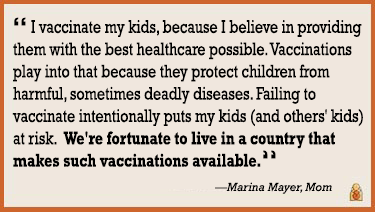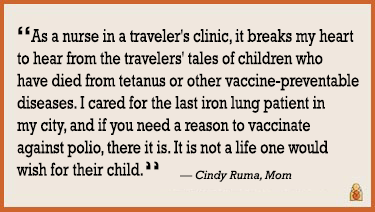Parents make all kinds of important decisions that impact their child's life―where to live, where to go to school, what to eat. Vaccines are a powerful way parents take control of their children's health and give them the best chances of growing into healthy young adults.
Vaccines keep children free from dangerous viruses and bacteria that continues to spread in the United States and in many parts of the world.
Immunization has greatly reduced or nearly wiped out many dangerous, infectious viruses and bacteria, such as polio, meningitis, and pneumonia. But, some remain just a plane ride away. In parts of the world, diseases like measles are still spreading; infants and children who are not immunized can easily catch it.
Recent measles outbreaks:
In 2017, more than 21,000 people in Europe caught measles; at least 35 children died from it. A 2014 U.S. outbreak led to 667 cases recorded across 27 states―the highest amount since measles was considered eliminated from the country in 2000.
Vaccinating our children is the best way to keep them free of infection when they are exposed to these germs.
Viruses and bacteria are unpredictable. Vaccines can control those threats.
You can't control what diseases your child is exposed to, or how bad a case he or she might get.
Don't underestimate the seriousness of chickenpox!
Most unimmunized children who get chickenpox will recover completely. But chickenpox can become serious―sometimes life-threatening―especially for babies, pregnant women, teens, and people with weak immune systems. Even healthy children can develop serious complications, and some children die. Others may experience lifelong health challenges such as seizures and mental disabilities.
Immunizing your child against infectious diseases guards against the threat these unpredictable bugs pose once they get in your child's body.
Vaccines build a protective wall around your family and community.
When you vaccinate your child, you also protect your family and friends who could catch a disease. This is especially important for people who cannot receive certain vaccines―including infants, pregnant women, elderly grandparents, and people whose immune systems are weakened by certain medications or conditions.
Vaccines strengthen your child's natural immunity.
Used in their smallest but most effective form, vaccines boost a child's natural defenses against illness. Vaccines train the immune system to identify and fight off dangerous bacteria and viruses that invade the body.
This helps prevent the need for harsh medications and procedures, such as:
Antibiotics. Since the pneumococcal vaccine was introduced in 2000, it has cut life-threatening diseases related to this type of bacteria―things like meningitis and pneumonia―in children by 99%. The vaccine has also led to a decrease in ear infections, the condition most often treated with antibiotics in children. Preventing these infections means children do not need as many antibiotics. It also means fewer infections that become resistant to antibiotics.
Invasive medical tests. Before the Hib vaccine, which became available in 1991, about 12,000 children got Hib disease―including meningitis―every year in the U.S. When a non-immunized infant shows symptoms of meningitis, doctors perform a "spinal tap" to test the fluid around the brain and spinal cord for the disease. Fortunately, that test is rarely needed in infants who have been vaccinated.
Hospitalizations. Vaccines help prevent the need for hospital stays. During the 2015-2016 flu season, for example, 310,000 people became so sick that they needed hospital treatment.
Surgeries. Children who get a lot of ear infections, for example, often end up having tubes put in their eardrums to drain the fluid and help save their hearing and speech development. Thanks to pneumococcal vaccine, fewer kids must get this and other types of surgery―including chest tubes for lung infections.
Vaccines are an investment in your child's health and your family's wellbeing.
Vaccines help protect your family's finances by avoiding costly medical bills and missed days at work. In fact, it's estimated that for every dollar spent, vaccinations save more than $5 in direct costs and about $11 in additional taxpayer costs.
Remember…
Vaccines are one of the medicine's greatest discoveries, saving an estimated 42,000 lives in the U.S. each year. Immunizing your child now helps give him or her a lifetime free from vaccine-preventable diseases.
Additional Information from HealthyChildren.org: